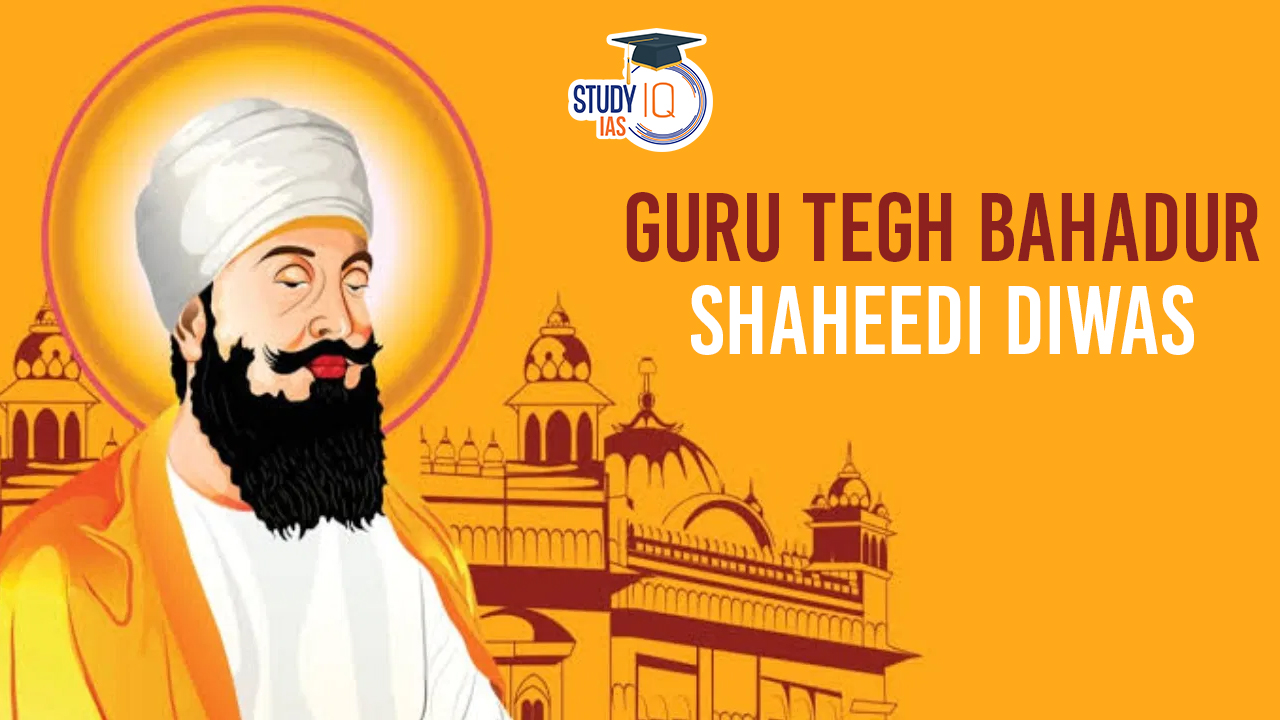Table of Contents
Guru Tegh Bahadur, the ninth Sikh Guru, played a crucial role in the history of Sikhism and is remembered for his selfless sacrifice for the protection of religious freedom. Guru Tegh Bahadur Shaheedi Diwas, or Martyrdom Day, is observed on November 24th.
We’re now on WhatsApp. Click to Join
Guru Tegh Bahadur Shaheedi Diwas
Guru Tegh Bahadur, the ninth Sikh Guru and the second Sikh martyr, dedicated his life to the defense of religious freedom and the protection of human rights. Every year on November 24th, his martyrdom is commemorated as Guru Tegh Bahadur’s Martyrdom Day or Shaheedi Diwas. Notably, he was also the father of the tenth Guru, Gobind Singh.
On November 24, 1675, Guru Tegh Bahadur made the ultimate sacrifice for the greater good, extending his protection to people outside his own community. His selfless act was driven by a commitment to safeguarding religion, human values, and principles. This day serves as a poignant reminder of his unwavering dedication to these ideals.
The locations associated with Guru Tegh Bahadur’s sacrifice and cremation have been transformed into revered Sikh holy places—Gurudwara Sis Ganj Sahib and Gurudwara Rakab Ganj Sahib—in Delhi. These gurdwaras stand as solemn monuments, symbolizing the Guru’s profound impact on the Sikh faith and his enduring legacy in the defense of religious liberty and universal human values.
Guru Tegh Bahadur Early Life, Teachings and Travels
Guru Tegh Bahadur was born on April 1, 1621, in Amritsar, Punjab, India, as the youngest son of Guru Hargobind Sahib, the sixth Guru of the Sikhs. His childhood name was Tyagamal, and from an early age, he exhibited spiritual inclinations. Guru Tegh Bahadur undertook extensive travels to spread the teachings of Guru Nanak Dev Ji, the founder of Sikhism. He engaged in missionary work and preached the principles of Sikhism, emphasizing equality, justice, and devotion to God. His travels took him to various parts of India, and he worked towards promoting a sense of unity among the Sikh community.
Guru Tegh Bahadur as 9th Sikh Guru (1665 to 1675)
- Spiritual Leadership (1665-1675): Guru Tegh Bahadur succeeded Guru Hargobind Sahib as the ninth Sikh Guru.
- Travels and Preaching: Extensively traveled to spread Sikhism, emphasizing equality and devotion to God.
- Resistance Against Forced Conversions: Opposed Mughal Emperor Aurangzeb’s forced conversions, defending religious freedom.
- Martyrdom (1675): Publicly executed in Delhi for refusing to convert or compromise principles.
- Contributions to Sikh Scripture: Writings and hymns included in the Adi Granth and Guru Granth Sahib.
- Social Service: Set up community kitchens and wells during travels for local welfare.
- Legacy and Anandpur Sahib: Founded the holy city, leaving an enduring impact on Sikh history.
Guru Tegh Bahadur: Stand Against Religious Persecution
One of the most significant aspects of Guru Tegh Bahadur’s life was his resolute stand against the religious persecution carried out by the Mughal rulers, particularly during the reign of Aurangzeb. The Mughal emperor sought to forcibly convert non-Muslims to Islam, and Guru Tegh Bahadur emerged as a champion for the oppressed, standing up against these forced conversions.
Guru Tegh Bahadur: Execution and Martyrdom
In 1675, Guru Tegh Bahadur was arrested in response to his opposition to the Mughal policies. Despite facing severe torture, he refused to convert to Islam or compromise his principles. Eventually, on the orders of Aurangzeb, Guru Tegh Bahadur was publicly executed in Delhi on November 24, 1675. His martyrdom was a powerful statement against religious tyranny and a testament to the Sikh commitment to the principles of justice and freedom of religion.
Gurdwara Sis Ganj Sahib
The site of Guru Tegh Bahadur’s execution is commemorated by the Gurdwara Sis Ganj Sahib, located in Delhi’s historic Chandni Chowk. The gurdwara stands as a symbol of the Guru’s sacrifice and is a place of reverence for Sikhs and admirers of religious freedom.
Legacy and Recognition of Guru Tegh Bahadur Ji
Guru Tegh Bahadur’s martyrdom is a central event in Sikh history, and his legacy is celebrated not only by Sikhs but by individuals and communities advocating for religious freedom worldwide. His teachings continue to inspire people to stand against injustice and to uphold the principles of compassion, equality, and tolerance.
In some parts of India, November 24th is observed as a public holiday to commemorate Guru Tegh Bahadur’s Shaheedi Diwas, providing an opportunity for people to reflect on his life and the values he stood for.
Guru Tegh Bahadur UPSC
Guru Tegh Bahadur, the ninth Sikh Guru (1665-1675), was a spiritual leader who championed equality and religious freedom. He traveled extensively, spreading Sikhism’s message of devotion and justice. During the oppressive reign of Aurangzeb, he courageously resisted forced conversions and sacrificed his life in 1675, becoming a symbol of steadfast principles. His writings are enshrined in Sikh scriptures, and the holy city of Anandpur Sahib stands as a testament to his enduring legacy in Sikh history.


 Governor's Assent to State Laws and Bill...
Governor's Assent to State Laws and Bill...
 Major Dhyan Chand Khel Ratna Award Winne...
Major Dhyan Chand Khel Ratna Award Winne...
 SAMARTH Udyog Bharat 4.0: Transforming I...
SAMARTH Udyog Bharat 4.0: Transforming I...





















